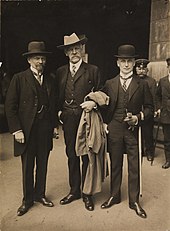Ernst Kohlschütter (geophysicist)
Ernst Kohlschütter (born July 11, 1870 in Halle (Saale) ; † October 18, 1942 in Potsdam ) was a German astronomer , geophysicist, geodesist and navigator.
Kohlschütter was the son of Ernst Kohlschütter in his second marriage to Elise Klincke († 1870). He studied physics, mathematics and astronomy in Halle, Strasbourg, Kiel and Paris from 1890 and received his doctorate in 1896 under F. Krüger in Kiel with a dissertation on the orbit of the comet from 1892. He then worked as an assistant at the Prussian Academy of Sciences from 1898 astronomer. From 1898 to 1900 he was entrusted with surveying work in the German protected area in East Africa (surveying of the border to British Central Africa in a German-British commission). In addition, on behalf of the Göttingen Academy of Sciences, he carried out gravity measurements with pendulums (East African Pendulum Expedition) and discovered large negative anomalies.
From 1900 he was in the Reichsmarineamt in Berlin and dealt with auxiliary devices for nautical science (inter alia, investigation of the kaw depth ) and nautical astronomy and was involved in navigation textbooks for the Reichsmarineamt. In 1909 he completed his habilitation in Berlin and became honorary professor in 1914. In 1906/07 he was on a research trip with the SMS Planet . He became a real admiralty and remained with the Reichsmarineamt until 1922.
In 1922 he became a full professor of geodesy in Berlin and director of the Royal Prussian Geodetic Institute in Potsdam, which he headed until 1935.
He constructed heavy pendulum devices to track down coal deposits. With Gustav Angenheister he was involved in the establishment of a commission for the geophysical survey of the empire.
He campaigned for international cooperation, he was chairman of the German group of the International Study Society for Exploring the Arctic with Aircraft (Aeroarctic) and for Germany a member of the Baltic Geodetic Commission founded in 1924.
After the outbreak of the Second World War he worked again for the Navy.
Kohlschütter received the Goethe Medal for Art and Science and the Silver Carl Ritter Medal from the Society for Geography in Berlin. He was an honorary doctor in Gdansk and an honorary member of the Geographical Society in Madrid and the Russian Geographical Society. In 1932 he became a member of the Leopoldina .
In 1901 he married Marthe Pernot and had a son and two daughters with her.
literature
- Hans Christian Free Life : Kohlschütter, Ernst. In: New German Biography (NDB). Volume 12, Duncker & Humblot, Berlin 1980, ISBN 3-428-00193-1 , p. 432 ( digitized version ).
Individual evidence
- ↑ Textbook of Navigation , Reichsmarineamt 1906, and Astronomical Navigation and Doctrine of the Tides for Lessons at the Imperial Naval School in Berlin , 4 parts, 1917
- ^ List of members Leopoldina , Ernst Kohlschütter
| personal data | |
|---|---|
| SURNAME | Kohlschütter, Ernst |
| BRIEF DESCRIPTION | German astronomer, geophysicist, geodesist and navigator |
| DATE OF BIRTH | July 11, 1870 |
| PLACE OF BIRTH | Halle (Saale) |
| DATE OF DEATH | October 18, 1942 |
| Place of death | Potsdam |
